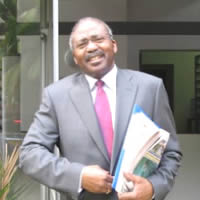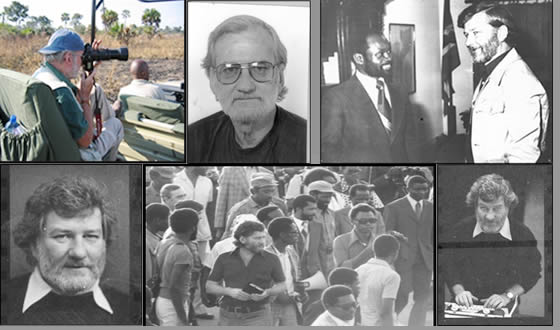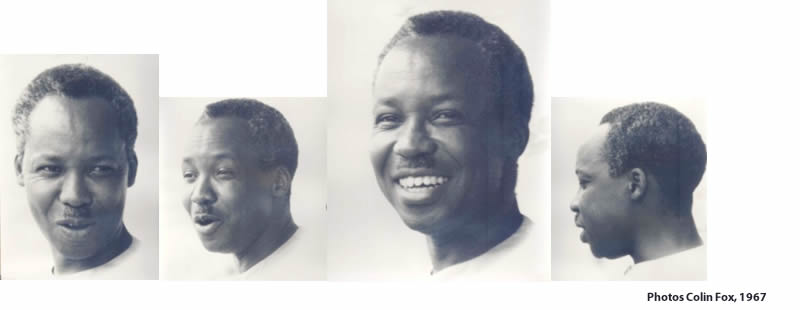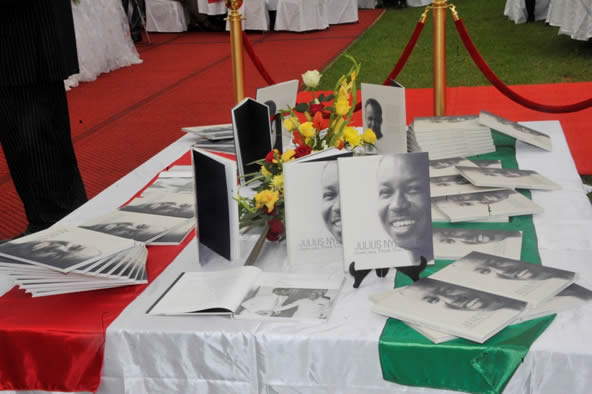Hon Professor Peter H Katjavivi, MP
Speaker of the National Assembly
Parliament of Namibia
Parliament Building, 14A Love Street
Windhoek, NAMIBIA
www.parliament.na
Hon Professor Peter H. Katjavivi, MP was elected Speaker of the National Assembly of Namibia in March 2015, after serving for five years as Government Chief Whip in Parliament. He was re-elected in March 2020 for a second term as Speaker. He is a member of the SADC Parliamentary Forum which is hosted by Namibia, and the Inter-Parliamentary Union (IPU). Hon Prof Katjavivi is a widely respected academic and historian who was the Founding Vice-Chancellor of the University of Namibia established after Independence, serving from 1992-2003 and transforming a previously segregated institution into a university with national character and relevance. He has more recently served as Chancellor of the Namibia University of Science and Technology. He is a leading member of the South West Africa People’s Organisation (SWAPO), and was deputy SWAPO Representative in East Africa at the start of the liberation war in 1966. He played a prominent role in the liberation of Namibia, building international support through diplomatic activity, as SWAPO representative in UK and Western Europe, and serving in other sectors including Legal and Economic Affairs, and Information and Publicity. He has devoted his life to the cause of social justice. He returned to Namibia in 1989 in preparation for independence on 21 March 1990. He was a member of the Constituent Assembly that drafted the constitution and a signatory to the Independence Constitution. From 2003, he served as Ambassador to the Kingdom of Belgium and the European Union, and then to Germany. In 2008 he was appointed Director General of the National Planning Commission in the Office of the President, and was first elected to Parliament in 2010. He has served on the Board of various international bodies and associations, particularly in education and development. Hon Prof Katjavivi has a D. Phil from Oxford University, UK and a Masters from Warwick University, UK. He was later a visiting fellow at Yale University, USA. He has written and edited several books, historical documents and papers, mainly about the liberation struggle. He speaks six languages.
Arlindo Lopes
Consultant Broadcasting and Media
MOZAMBIQUE
The Vice Chairperson of the SARDC Board is Arlindo Lopes from Mozambique. He is a former Secretary General of the Southern African Broadcasting Association (SABA), before moving to MultiChoice Southern Africa as a consulting manager. He has recently retired as General Manager (Regulatory and Corporate, Angola and Mozambique) for MultiChoice Africa Ltd. He is a former Chairperson of Televisão Moçambique (TVM) and of the Union of National Radio and Television Organisations of Africa (URTNA), which was revitalized under his leadership. He is a respected journalist and media consultant with more than 35 years’ experience on various newspapers including a local daily Diário, the national newspaper Notíçias (as reporter, news editor and director), Tempo news magazine as senior writer, and the Sunday newspaper Domingo as senior writer. From 1987 he was in government service, becoming National Director (Permanent Secretary) in the Ministry of Information and after 1995, Director of Information in the Office of the Prime Minister. He has an MA in Media Ecology from New York University.
Professor Reginald H Austin
Legal and Electoral Consultant
Harare, ZIMBABWE
Professor Reg Austin is a Zimbabwean law professor who was active in the liberation struggle and was a member of the legal team for the independence negotiations at Lancaster House in London in 1979. He was Dean of Law at the University of Zimbabwe after Independence. He was later Director and Chief Electoral Officer of the UN Observer Mission to South Africa (UNOMSA) for the 1994 transitional elections, and UN Director of Elections in Cambodia in 1993. He organised the successful national elections in Afghanistan in 2003, as Chief Electoral Officer of UNAMA, and in the Solomon Islands in 2006. He was appointed by the UN Secretary-General as one of three high-level electoral experts to verify the conduct of each phase of the electoral process in East Timor for presidential and parliamentary elections in 2007. Prof Austin has facilitated a number of key initiatives for SARDC including observation of Zambia’s first multi-party elections and the first multi-party conference on elections in Angola (both 1991), and contributed to SARDC workshops for pre-independence Namibia (1989) and post-conflict Mozambique (1992). He was Director of the Legal and Constitutional Division of the Commonwealth Secretariat (1993-98) and a Director at International IDEA in Stockholm (1998-2002). He was the first chairman of the Zimbabwe Human Rights Commission, and has served as consultant for many legal and electoral activities.
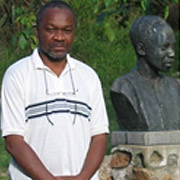 BOARD MEMBER
BOARD MEMBER
Godfrey Madaraka Nyerere
JKN Hotels (Butiama)
Box 620, Musoma,
UNITED REPUBLIC OF TANZANIA
Godfrey Madaraka Nyerere is a writer and cultural tourism specialist who lives at Butiama, in northern Tanzania. He is Director of JKN Hotels Ltd, which offers visitors the opportunity to stay at Mwitongo in the village of Butiama that is the birthplace of Tanzania’s founding President, Mwalimu Julius Kambarage Nyerere, who was buried there after his death on 14 October 1999. The Julius Nyerere Library is located at Mwitongo and the Julius K. Nyerere Museum is nearby. Cultural and historical tours are available, and performances of traditional dances from the Mara region, as well as nature hikes. Madaraka Nyerere lists cycling and mountaineering among his interests, whether it’s a one-hour climb up the nearby Mt Mtuzi or several days climbing the rather higher Mt Kilimanjaro, a feat he has accomplished more than ten times and continues to climb regularly for the Mwalimu Nyerere Charity Climb. He is the sixth child and youngest son of Julius and Maria Nyerere. A banker by training and a former columnist for the national weekly, the Sunday News, in Tanzania, he maintains his column through a popular blog, From Butiama and beyond… He has been active in hosting the launch in April 2022 of the commemoration of the 100th anniversary of Mwalimu Nyerere’s birth, and the annual memorial to his death when the Torch of Freedom (Mwenge wa Uhuru) is carried around the country with messages of peace and freedom, in the Uhuru Torch Race ending in Butiama in October each year.
 BOARD MEMBER
BOARD MEMBER
Mary Rusimbi
Women Fund Tanzania
17 Rufiji Street, off Kahama Road,
Msasani, Dar es Salaam,
UNITED REPUBLIC OF TANZANIA
www.wft.or.tz
Mary Rusimbi is co-founder and the former Executive Director of the Women Fund Tanzania whose goal is to contribute towards women’s rights and empowerment. She continues to serve on the Board of WFT and to mentor young women, as well as implementing a project to document Mwalimu Nyerere’s progressive policies of equality. She is also a founding member of the Tanzania Gender Networking Programme (TGNP), where she was Executive Director for 10 years until 2007. Three years later, she was elected Chairperson of TGNP, a widely respected umbrella group and network that supports community development and gender advocacy. She is an organizational development specialist and trainer with more than 25 years of experience in gender policy analysis and formulation, trainer in gender responsive budgeting, and a long-time activist who has worked in development agencies and served on the board of a number of non-governmental agencies. She has accumulated considerable regional gender knowledge and experience which she is often called upon to share as a consultant in the SADC region. As a founder and board member of several organizations, she has played key leadership roles in the women’s movement for many years, in promoting gender equality, equity and social transformation nationally, regionally and internationally. She has written widely on the prospects for gender equality, including a gender-reference checklist for elections. She has published numerous articles and book chapters on gender and development issues. She holds a Masters degree in Education from University of Auckland, and a Bachelors degree in Education from the University of Dar es Salaam.
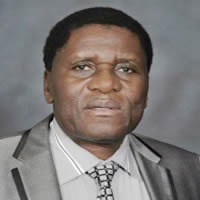 BOARD MEMBER
BOARD MEMBER
Eng. Remigious Makumbe
Consultant Regional Integration
ZIMBABWE
Eng. Remigious Makumbe has extensive knowledge of the SADC political and economic landscape, having worked on SADC regional integration issues in various capacities for more than 25 years, starting with the Southern Africa Transport and Communications Commission which he joined in March 1995 as a SADC Railway Technical Expert. He spent a few years as Executive Director of the Southern African Railways Association, before joining the SADC Secretariat in January 2005 as Director of Infrastructure and Services, a position he held until December 2016. During his service with the SADC Secretariat, Eng. Makumbe distinguished himself as a reservoir of knowledge on infrastructure and other regional integration issues, including peace and security. Major highlights of his time with SADC include overseeing the development of the Regional Infrastructure Development Master Plan (2012), and contributing to the development of the SADC Industrialisation Strategy and Roadmap (2015). His extensive knowledge of SADC issues and ability to network with stakeholders at all levels, saw him serve simultaneously as Chief Director at the SADC Secretariat, with oversight of all programmatic areas of regional integration. Since leaving the SADC Secretariat, Eng. Makumbe has been consulting for various regional and international organisations, mostly on SADC regional integration issues. He serves and has served on several boards and taskforces across the region, including as a member of the Presidential Advisory Council in Zimbabwe and the Panel of Experts for the Minister of Transport in South Africa. He serves as a consultant for the Climate Resilient Infrastructure Development Facility (CRIDF). He holds several qualifications, including a BSc. Engineering (Electronics and Power) degree; a B.Comm (Economics and Transport) degree; MSc in Policy Studies (Policy and Regional Integration); and an Honorary Doctorate in Business Administration.
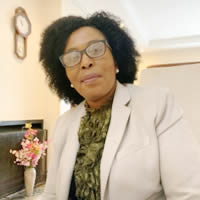 BOARD MEMBER
BOARD MEMBER
Chazile Magongo
Economist, Government service
KINGDOM OF ESWATINI
Ms Magongo is an Economist who has served in the Government of the Kingdom of Eswatini since 1984 in various ministries, including Agriculture and Cooperatives; Public Works and Transport; Foreign Affairs and International Cooperation; and Economic Planning and Development. She served as the Director of the SADC National Coordination Unit under the Ministry of Foreign Affairs from 2009 to 2019 and has extensive knowledge of regional integration issues. As the focal point for SADC regional integration issues in Eswatini, Ms Magongo facilitated collaboration with government ministries during the period when Eswatini chaired SADC August 2016 to August 2017. She has a deep appreciation of the importance of the policy research and communication work done by SARDC, gained through the period when she served as the SADC focal point in the country. In addition to her work as a director in the Ministry of Economic Planning and Development, Ms Magongo has also served as the National Coordinator of a project to establish the Secretariat for the Eswatini chapter of the Federation of National Associations of Women in Business in Eastern and Southern Africa (FEMCOM). Ms Magongo oversaw the development of a strategy and implementation plan for the women programme. She holds a Master of Business Leadership degree; an MSc in Economics; and a BSc Economics.
 FOUNDING DIRECTOR AND SPECIAL PROJECTS
FOUNDING DIRECTOR AND SPECIAL PROJECTS
Phyllis Johnson
SARDC
Julius K. Nyerere House
15 Downie Avenue, Belgravia,
Harare, ZIMBABWE
www.sardc.net Knowledge for Development
The Founding Director of SARDC responsible for Special Projects is a writer, editor, broadcaster and publisher, a long-time resident of southern Africa and student of southern African affairs. She has played a role in institution building at SARDC and elsewhere, including the Zimbabwe Publishing House, Zimbabwe International Book Fair, and the African Publishing Group, as well as SARDC’s History Institute and the Institute for China Africa Studies in Southern Africa. She has written and edited numerous books and articles, mainly on the historical, socio-political and security dimensions of regional development, and also on regional policy issues on environment and water issues, as well as gender. She has written several books on the liberation struggle in southern Africa, including The Struggle for Zimbabwe, Frontline Southern Africa: Destructive Engagement, Apartheid Terrorism: The Commonwealth Report, The Chitepo Assassination, and a biography of the former Commonwealth Secretary-General, Chief Emeka Anyaoku, entitled Eye of Fire. She was born in Canada but has spent more than half of her life in Africa, and made her home in Zimbabwe, with her husband, the late journalist and historian David Martin.
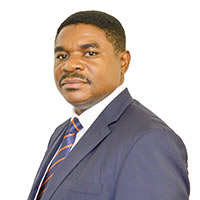 EXECUTIVE DIRECTOR
EXECUTIVE DIRECTOR
Munetsi Madakufamba
SARDC
Julius K. Nyerere House
15 Downie Avenue, Belgravia, Harare, ZIMBABWE
Tel 263 4 791141
Email sardc@sardc.net
The Executive Director of SARDC is an economist and specialist in regional development and integration, and has a deep knowledge of SADC issues, opportunities and challenges over the past two decades. He played a significant role in policy analysis for the regional industrialization agenda, and served on the Task Force that developed the Revised Regional Indicative Strategic Development Plan (RISDP 2015-2020). He is Editor of the official SADC magazine Southern Africa Today (SADC Today), a prestigious publication produced by SARDC since 1997. He has presented various papers at conferences and think tanks in China and elsewhere, most recently on the application of Special Economic Zones in southern Africa. He writes widely on regional economic development and integration, including the current challenges of infrastructure and energy supply, and the opportunities of renewable energy. He is an adviser to the SADC Energy Thematic Group, among others. He has a BSc in Economics and a Masters in International Relations from the University of Zimbabwe.
 SECRETARY TO THE BOARD
SECRETARY TO THE BOARD
Joseph Ngwawi
CONSULTANT REGIONAL ISSUES AND COMMUNICATION
SARDC
Julius K. Nyerere House
15 Downie Avenue, Belgravia, Harare, ZIMBABWE
Tel 263 4 791141
Email sardc@sardc.net
Joseph Ngwawi has an academic background in economics and previously served as the Head of SARDC’s Regional Economic Development Institute (REDI). He was also the editor of the regional development magazine, Southern Africa Today that is produced by the SARDC on behalf of the SADC Secretariat. Among other assignments, he served as an advisor to the SADC Energy Thematic Group. He has researched and written reports and papers, chapters and articles on a wide range of regional issues that have been published in national and regional newspapers and journals. His main areas of research interest are energy and infrastructure development, economic governance (including illicit financial flows), trade and industrialisation. He began his career in 1993 when he joined the Government of Zimbabwe as an Administrative Officer in the then Ministry of National Affairs, Employment Creation and Cooperatives. He joined the media in 1996 and rose through the ranks to become Business News Editor at the Financial Gazette by the time he left the mainstream media in 2002. He joined a corporate communications consultancy where he was in charge of the overall administration of all client portfolios. He joined SARDC in 2005 until 2021, and was appointed by the SARDC Board as Secretary to the Board in January 2017 to date.
IN MEMORIAM
 BOARD MEMBER
BOARD MEMBER
Dr Anderson B Shankanga (Late)
Educational Specialist and Consultant
Harare, Zimbabwe
Email: shankangab@yahoo.co.uk
ZAMBIA
Dr AB Shankanga was an educational specialist and consultant, and former UNESCO regional director, with more than 30 years experience in developing and strengthening education at national, regional and continental levels. He was the Founding Director of the Institute for Peace, Leadership and Governance at Africa University in Mutare, Zimbabwe, and later Senior Research Adviser at Africa University. Dr Shankanga is an education and governance specialist from Zambia, and former Director of the UNESCO Sub-regional Office for Southern Africa, where he worked with SADC in establishing a consultative conference of Ministers of Education and on the SADC Initiative in Education Policy Development, Planning and Management. He served in the UN system for more than 20 years, after leaving the Ministry of Education in Zambia. His doctorate was in Curriculum Development from the University of Southern California. (b 15 April 1939 d 04 August 2021)
SARDC FOUNDING DIRECTOR
David Martin (Late)
Chairman and CEO, African Publishing Group
Box BW-350, Harare, Zimbabwe
Chairman of African Publishing Group (APG) and a founding director and former Chairman of Zimbabwe Publishing House (ZPH) as well as the Zimbabwe International Book Fair, David Martin was an accomplished writer, photographer and investigative journalist. He worked in the national media in the United Republic of Tanzania (Tanganyika Standard) and the UK (Africa correspondent of The Observer) as well as writing for other media in Africa and Europe. He wrote the first book exposing the regime of Idi Amin in Uganda, titled General Amin. He marched with the Mozambique Liberation Front (Frelimo) in the liberated zones in 1973 prior to Independence in 1975. David Martin wrote several books about the liberation of southern Africa, including The Struggle for Zimbabwe and others with Phyllis Johnson, and promoted the marketing of African history through area-specific tourism guides. He was the author and photographer of Into Africa Travel Guides, a series of more than 20 area-specific guidebooks for visitors, primarily on Tanzania, published in collaboration with Tanzania National Parks (Tanapa). Others are on places in Mozambique, Namibia and Zimbabwe. He was a visionary writer who applied the knowledge he acquired from his close relationship with Presidents Julius Nyerere in Tanzania and Samora Machel of Mozambique as well as the legendary commander of the Zimbabwe liberation forces, General Josiah Tongogara, Robert Mugabe, Sam Nujoma, OR Tambo, Eduardo Mondlane, Kenneth Kaunda, Agostinho Neto and others. He was widely respected for his honesty, integrity and trust, reflected through his writing and his relations with people. (b 14 April 1936 d 18 August 2007)
SARDC FOUNDING PATRON
Mwalimu Julius Kambarage Nyerere (Late)
Mwalimu Julius Kambarage Nyerere became an icon in Africa for his vision and steadfast support for the liberation of the continent from colonial control, and for unifying his country made up of more than 120 ethnic groups and two administrations (Mainland formerly Tanganyika, and Zanzibar) into the United Republic of Tanzania. Although Independence day is marked in 1961 and Union day in 1964, he was very clear that his country would not be free until the rest of Africa was free, including apartheid South Africa, a feat achieved in 1994. For 30 years from 1964 to 1994, his country hosted the Organization of African Unity (OAU) Liberation Committee, mobilizing material support for the liberation movements. He did this not only as President, but he mobilized the entire population behind him, with individuals giving one or two shillings in “people-to-people” support. Tanzanians, even in rural areas, are very much aware of their neighbours and his legacy to this day. His pre-independence statement to the Legislative Council in 1959 is regarded as a classic and much-quoted,
“We the people of Tanganyika would like to light a candle and put it on top of Mount Kilimanjaro which would shine beyond our borders, giving hope where there was despair, love where there was hate, and dignity where before there was only humiliation.”
Nyerere chaired the informal regional grouping of independent Front Line States from its inception in 1974 until he retired as President of Tanzania in 1985. He understood that political liberation was only the beginning and that it was necessary for people of the region to begin to think about the future in a unified regional context. He wanted to create an institution to document and research relevant issues from a regional perspective. This was discussed by David Martin and the Tanzanian Foreign Minister, Benjamin Mkapa, in Maputo in 1977 at the UN Conference in Support of the Peoples of Namibia and Rhodesia, and with President Kaunda in Zambia. However, it took another eight years for the Southern African Research and Documentation Centre (SARDC) to emerge in 1985, with its first publication in 1986, and to have premises in January 1987, in Harare and Maputo (following the instruction of the late President Samora Machel in 1986). During that period, Nyerere chaired the South Commission and became the first Chairman of the South Centre, an institution of and for developing countries, and in 1989, he agreed to be become the Founding Patron of SARDC.
Mwalimu Nyerere was Prime Minister of Tanganyika from Independence in December 1961 to December 1962 when he became President. He brought the islands of Zanzibar into a Union in 1964, to form the United Republic of Tanzania. He was born in northern Tanzania, in the village of Butiama, near Musoma, in 1922 and he was educated at Tabora Government Secondary School, Makerere University in Uganda where he earned his diploma in education, and Edinburgh University in Scotland where he obtained his Master of Arts degree in Economics and History in 1952. He was the first Tanzanian to attend a UK university, and the second to gain a university degree outside of Africa. (b 13 April 1922 d 14 October 1999)
Asante Sana, Thank You Mwalimu is the title of a book published by SARDC with African Publishing Group and others in 2015. The book contains historical photos of Nyerere and key excerpts from his speeches. The Introduction is written by David Martin about Mwalimu, and the Foreword is by President Robert Mugabe of Zimbabwe, then chairman of SADC and the African Union. The book is available from SARDC, African Publishing Group and bookshops, and from the co-publishers – House of Books, Mkuki na Nyota, and National Gallery of Zimbabwe.
The classic story about his transformation of the country in the first 10 years after Independence, titled Nyerere of Tanzania by William E. Smith, and a book written by Mwalimu Nyerere in 1995 about the political importance of the national Union, Our Leadership and the Destiny of Tanzania (English and Swahili), are available from
African Publishing Group, Harare
Email apg@africanpublishinggroup.com
Three volumes of speeches are available from Mwalimu Nyerere Foundation in Dar es Salaam, Tanzania
Website www.nyererefoundation.or.tz
NYERERE Freedom and Unity/ Uhuru na Umoja, Selection from Writings & Speeches 1952-1965, OUP 1967
NYERERE Freedom and Socialism/ Uhuru na Ujamaa, Selection from Writings & Speeches 1965-1967, OUP 1968
NYERERE Freedom and Development/ Uhuru na Maendeleo, Selection from Writings & Speeches 1968-1973, OUP 1973
